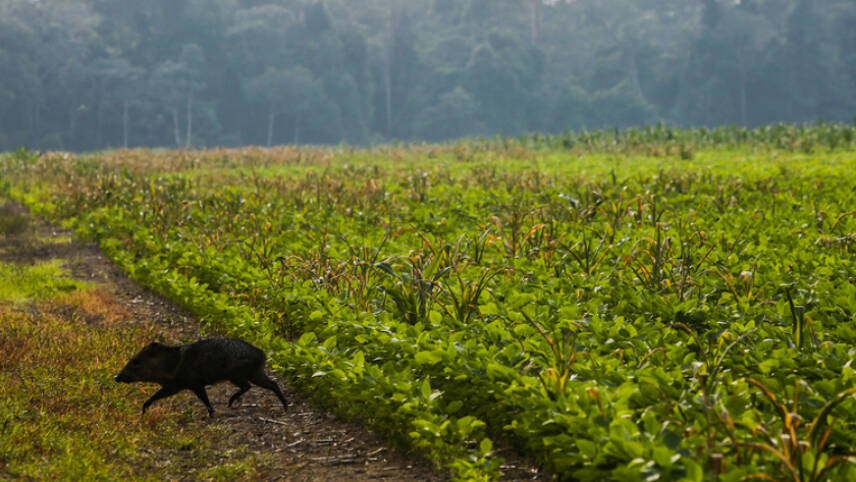Register for free and continue reading
Join our growing army of changemakers and get unlimited access to our premium content

Image: Lunae Parracho for Greenpeace
This funding, raised through green bonds, will provide incentives to 36 farmers for a year-long trial which should then be extended to four years in total. Farmers will receive incentives for making the top-level commitments in the first instance, and then for delivering on them.
Along with those contributing financially to the first programme, which also includes sponsorship from US cocoa and chocolate product manufacturer Barry Callebaut, many more major international soy buyers participated in the design of the RCF. It is hoped the trial stage will provide valuable insight into how the mechanism works in practice on farms and inspire other organisations and businesses to lend their support.
The farmers set to participate in the scheme, called the Responsible Commodities Facility (RCF), are located in the Matopiba, Goiás and Mato Grosso parts of Brazil’s Cerrado. The Cerrado which once covered a quarter of Brazil, loses an area the size of London every two months as global demand for products including cocoa, palm oil and soy increases, according to WWF and RSPB.
This has devastating consequences for local biodiversity and reduces the ability of the soil to provide carbon sequestration. In time, these trends will decrease farmers’ ability to grow.
An independent committee will oversee the management of the new RCF and its environmental impacts. Sitting on the committee are the UN Environment Programme (UNEP), The Nature Conservancy, BVRio, WWF, Conservation International Brazil, Proforest and the Instituto de Pesquisa Ambiental da Amazonia (IPAM).
Tasked with running the RCF is Sustainable Investment Management Ltd, a financial services firm with a specialism in the UK and Brazil. BVrio’s co-founder and director Pedro Moura Costa is the firm’s chief executive and BVRio’s other co-founder, Mauricio Moura Costa, is its chief operating officer.
Pedro Moura Costa said: “Crop finance is a key part of soy farmers’ business models and there is a huge appetite and market for green finance. By directing this flow of green finance we can support soy production while rewarding the voluntary conservation of native vegetation.
“The urgent need to reduce GHG emissions from deforestation requires a new flow of financial resources to those at the frontline of agricultural production. At the same time, it is important to reconcile the objective of conservation with that of economic production, so that one complements the other.”
Sustainable Investment Management Ltd has stated that, as well as the three UK supermarkets, “many more” soya buyers participated in the RCF’s design.
Waitrose’s executive director James Bailey said: “We’re delighted to be one of the leading investors supporting this inaugural fund and applaud Tesco and Sainsbury’s for their leadership on this also… We hope this pilot fund will demonstrate the huge opportunity for green finance to incentivise responsible farming practices that ensure we protect our global forests. Achieving this potential, however, will require broader uptake, and I’d therefore appeal to fellow food sector businesses and to financial investors to join us in supporting and investing in this extremely important initiative to help protect the Cerrado before it’s too late.”
A timely announcement
The announcement comes shortly after the publication of an investigation by Unearthed, the Bureau of Investigative Journalism and Ecostorm, concluding that 1,000 sq km of land in the Brazilian Amazon has been deforested by soy farmers within the past decade. The researchers used satellite maps, records of land tenure and maps to reach this conclusion.
Much of this land has since been converted to use for corn, cattle and other commodities after a ban was imposed on the sale of soy grown on land deforested after 2008, the paper claims. It also points to the sale of soy land for high prices, making it harder to identify when deforestation took place. Moreover, savannah land, like the Cerrado, is not covered by this ban.
Unearthed is urging those involved in livestock value chains and the production of soy products for human consumption in Europe to more closely assess deforestation risks in their supply chains. Firms named in the investigation include Bunge and Cargill.
What are the supermarkets doing on soy?
According to the Intergovernmental Panel on Climate Change, food and drink production has been the driver of 75% of deforestation by area size to date. Soy is considered one of the main contributors to deforestation in Brazil, with one study finding that 10% of land deforested in Brazil between 2006 and 2017 is now used for soy.
Most of this soy is used to feed animals, not people. WWF states that 77% of the world’s soy crop is fed to livestock.
Tesco, Sainsbury’s and Waitrose, like most other grocery retailers, have updated their targets and projects aiming to tackle soy-led deforestation in recent years. Late last year, all three firms were among the signatories of a new commitment to only source soy from whole areas verified as deforestation-free by 2025, known as the UK Soy Manifesto.
More broadly, Tesco, Sainsbury’s and Waitrose are signed up to the WWF Retailers’ Commitment for Nature, with a collective aim to halve the environmental impact of UK shopping baskets by 2030. This Commitment was launched at COP26 in Glasgow, building on WWF and Tesco’s work in this area.


Please login or Register to leave a comment.